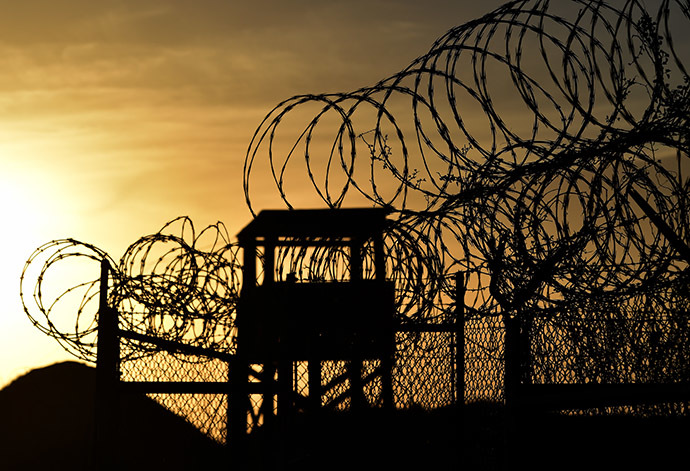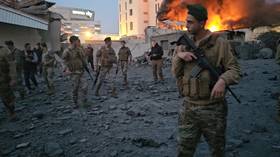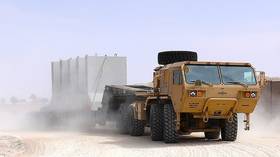Senate accuses CIA of torturing prisoners, overstepping legal boundaries

The intelligence committee of the United States Senate has released its long-awaited congressional report detailing the CIA’s use of torture on prisoners in the wake of the September 11, 2001 terrorist attacks.
On Tuesday, the executive summary of the roughly 6,000-page report was finally published by the Senate Intelligence Committee, for the first time exposing the panel’s findings following a four-year-long investigation conducted at a cost of more than $40 million.
“There may never be the right time to release this report,” Sen. Dianne Feinstein (D-California), the committee’s chair, said on the Senate floor early Tuesday concurrent with the release of the executive summary. “The instability we see today will not be resolved in months or years. But this report is too important to shelf indefinitely.”
A fraction of the full report, the 480-page executive summary contains the committee’s conclusions concerning the post-9/11 tactics deployed by the CIA under the administration of US President George W Bush in an attempt to gain intelligence from suspected terrorists. Those techniques, including sleep deprivation and the simulated-drowning practice known as waterboarding, have since been reined in by Pres. Barack Obama; with respect to their impact, Sen. Feinstein said previously that her panel’s probe lent to “critical questions about intelligence operations and oversight” and showed that the CIA undermined "societal and constitutional values that we are very proud of.”

Among the report’s findings is that: the CIA’s use of enhanced interrogation techniques was not an effective means of acquiring intelligence; the CIA’s justification for the use of such tactics rested on inaccurate claims of their effectiveness; the interrogations and conditions of confinement of detainees was “far brutal and far worse” than the CIA claimed; and that the CIA “actively avoided or impeded congressional oversight of the program.”
One portion of the report reveals that the committee analyzed 20 of “the most frequent and prominent examples of purported counterterrorism successes that the CIA has attributed” to its interrogation techniques, “and found them to be wrong in fundamental respects.”
“In some cases, there was no relationship between the cited counterterrorism success and any information provided by detainees during or after the use of the CIA's enhanced interrogation techniques,” the committee determined.
“Some of the plots that the CIA claimed to have ‘disrupted’ as a result of the CIA's enhanced interrogation techniques were assessed by intelligence and law enforcement officials as being infeasible or ideas that were never operationalized,” reads another portion of the report’s summary.

In a rebuttal released by the CIA on Tuesday, however, the agency said those 20 instances “remain valid examples of the program’s effectiveness,” nonetheless acknowledging “some flaws in its past representations.”
According to excerpts, some detainees would be stripped naked and shackled, then led along dirt hallways while being beaten by CIA officials. Some prisoners were told they’d never leave alive, and others were told by agents that their mothers would be raped or killed. Routinely, detainees were force-fed rectally, according to the Senate’s investigation, despite officials having not found any medical necessity in doing as much; as a result, detainees suffered from rectal prolapses and other after-effects.
“These comments are not a condemnation of the CIA as a whole,” Feinstein told the Senate on Tuesday. “The CIA plays an incredibly important part in our nation’s security and has thousands of dedicated and talented employees. What we have found is that a surprisingly few people were responsible for designing, carrying out and managing this program.”
Ahead of Tuesday’s publication, both Bush and his former vice president, Dick Cheney, went on the record to defend the CIA’s tactics and condemn any efforts to discredit them.
“We’re fortunate to have men and women who work hard at the CIA serving on our behalf,” Bush told CNN’s Candy Crowley for an interview on the “State of the Union” television program that aired Sunday. “These are patriots and whatever the report says, if it diminishes their contributions to our country, it is way off base.”
Speaking to the New York Times, Cheney called the interrogation tactics “absolutely, totally justified,” contrary to the committee’s findings.

“What I keep hearing out there is they portray this as a rogue operation and the agency was way out of bounds and then they lied about it,” he told the Times in a telephone interview. “I think that’s all a bunch of hooey. The program was authorized. The agency did not want to proceed without authorization, and it was also reviewed legally by the Justice Department before they undertook the program.”
Some American officials doubt the international community at large will agree with the Bush administration, however, and have warned that releasing the report could provoke violence.
"I think this is a terrible idea," Rep. Mike Rogers (R-Michigan), the chair of the House Intelligence Committee, told CNN over the weekend with regards to the report's release."Foreign partners are telling us this will cause violence and deaths. Our own intelligence community has assessed that this will cause violence and deaths."
"There are some indications that the release of the report could lead to a greater risk that is posed to US facilities and individuals all around the world," White House spokesman Josh Earnest added on Monday. "The administration has taken the prudent steps to ensure that the proper security precautions are in place at US facilities around the globe."












